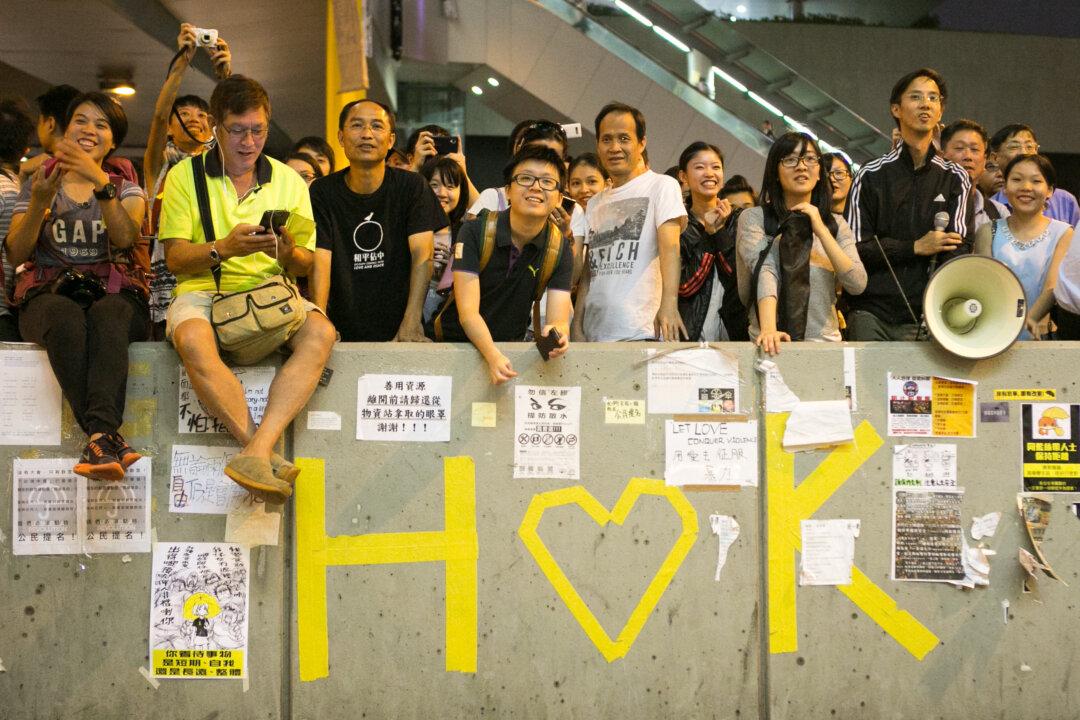HONG KONG—A third day of “preliminary talks” between student leaders and government officials has borne fruit, however humble, with a joint announcement late Tuesday evening that formal talks would begin Friday.
Carrie Lam, Hong Kong’s second-in-charge, and some deputies, will meet with no more than five of the students at a location yet to be determined. They will discuss “constitutional development,” though the actual menu of items for discussion, let alone resolution, is not yet clear.
Lester Shum, deputy secretary of the Federation of Students, which is spearheading the discussions, said at a press conference late Tuesday that he hopes the government “positively and directly faces the political questions, not using tricks to confuse Hong Kong people.”
Shum also blamed Chief Executive Leung Chun-ying for the situation having reached the deadlock it has.
He made clear that large numbers of young people would take to the streets if the government does anything to try to forcefully clear the protests.
Joshua Wong, a 17-year-old activist, told the crowd lounging and standing on Harcourt Road, the main space occupied outside government offices late in the evening, that their presence was still important as dialogue with the government commenced.
There is thus likely to be a large turnout Friday afternoon, when the discussions begin. Friday will also be the last day of the semester for many university students, which could mean a mass influx of more protesters next week.
Noticeably fewer young people were on the streets in the three occupied areas on Tuesday, the 10th day of the protests sparked by students who are demanding a genuine democratic process in selecting the city’s chief executive, effectively a mayoral role.
In the early morning hours, it appeared that only a few hundred protesters had slept on the occupied roads around Admiralty, where the government headquarters are located—a contrast to the closer to thousands that camped out over the weekend.
Some parts of the occupation, in particular around the financial district of Central, which the Occupy Central movement is named after, were occupations in name only. Barricades in several places remained in place, while hardly any protesters were around to man them.
What appeared to be thousands still turned out in the evening, however, on and around Harcourt Road, next to government offices.
And they seemed as determined as ever to wait out the government.
“When our demands have succeeded—that’s when we‘ll stop coming out here,” said Lily Lo, a 20-year-old saleswoman. “I don’t know how long that will take, but we’ll persist until we get universal suffrage.”
When asked whether she would be still out in a month, she offered a hesitant agreement. But a moment later, demonstrating the tentative nature of the current mobilization, admitted that if others began packing up and going home before their goals had been met, she and her friend, Chloe Chan, 20, also in sales, would likely leave right alongside them.
Though the Hong Kong government has indicated that it does not intend to use force, at least to disperse the protests at Admiralty, police said they might make a move on protesters in Mong Kok, the blue-collar shopping district whose several main streets have been blocked off.
“The location has become a high risk area,” said Steve Hui, the police spokesperson, on Tuesday. “To prevent violent crimes and avoid harm to life and property, we will take action at the appropriate time.”
The protesters there are largely independent of the student leaders who oversee the main body of protesters at Admiralty, and the daily rhythm at Mong Kok is typically rougher and more confrontational. Triads have beaten and harassed students at the site, and local shop owners and opponents to the protesters turn up from time to time to make their views known. Screaming matches ensue.
Separately on Tuesday, Jasper Tsang, the president of Hong Kong’s LegCo, or legislative council, said that the council’s Wednesday meeting would be canceled because of the protests, and concerns by some lawmakers over their safety. The session was to be the first after the summer recess in July.
What concessions the students will be able to wring from Hong Kong authorities is quite unclear, given that many of their key demands are determined by politics in Beijing, not by the figurehead chief executive.






